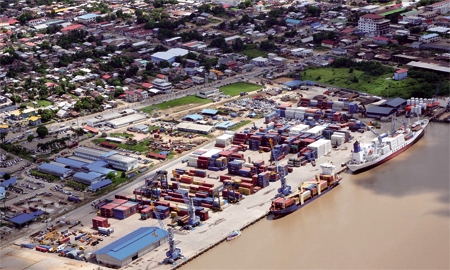With around 1,200 km (745 miles) of navigable waterways, and numerous ports dotted along its banks, in Suriname’s historic shores might just lay the country’s bright future.
Suriname’s strategic location gives it a clear competitive advantage over its neighboring countries. “Suriname is the maritime hub to both the Caribbean and the Latin American market, which means exports to both markets are a lucrative possibility and they are also feasible through French Guyana,” explains Falisie Pinas, Minister of Transport, Communication and Tourism.
Global investors have already begun targeting the country’s harbors in their ambitions of global expansion. UAE’S DP World, for example, has already carried out a substantive investment by acquiring a controlling interest in both Integra Port Services (IPS) and in Suriname Port Services (SPS).
IPS and SPS form part of
Integra Marine & Freight Services (
Integra), the key terminal operator of the Port of Paramaribo.
Paramaribo’s is the principal port of Suriname, handling 90% of all general import and export cargoes. Since coming under the control of Integra in 2007, the port has undergone dramatic rehabilitation and expansion.
By 2008 the level of container traffic through the port had grown to 57,000 TEUs (equivalent to a 20ft container) from just 18,000 in 2000. In 2010 that number grew up to 91,000 and is expected to reach 100,000 TEUs by the end of 2012.
Furthermore, in 2010 “the port was given an award by the Caribbean Shipping Association as the Best Multipurpose Terminal of the Year,” explains Remy Vyzelman, President and Managing Director of Integra. “This was because of the efficiency, reliability, and dependability of the port,” now a modern terminal with more container handling capacity, better access, and improved infrastructure and tighter security.
“Suriname is the maritime hub to both the Caribbean and the Latin American market, which means exports to both markets are a lucrative possibility.” Falisie Pinas,
Minister of Transport,
Communication and Tourism |
Despite technological headway, Mr. Vyzelman singles out the company’s philosophy of success: “The best equipment is worthless if you don’t have the proper people to operate and maintain it.”
And their efforts and investments have been certified. “We were the first company in Suriname that was fully ISO 9000:2000 certified in 2002. In 2007 we also got the ISO 14000 and 80001, which are the environmental, and the health and safety certifications,” adds Mr. Vyzelman.
Integra’s represents a story of success, futile without the existence of N.V. Havenbeheer. Their relationship is an example of how the public and private sectors of Suriname are working hand in hand towards a common bright future.
N.V.
Havenbeheer is the public port management company which manages the ports of Paramaribo and Nickerie. Though government-owned, it acts independently. “We are a landlord organization, we limit ourselves to the supervising and controlling of the port activities, but the actual cargo handling is being done by the privately owned terminal operators. As terminal operators, they invest in port equipments and in superstructure, while we lease the facility to the terminal operators,” explains John A. Defares, General Manager of N.V. Havenbeheer.
Future plans for Pararimbo include making it a hub connecting the eastern coast of South America and the eastern coast of North America. Similarly, the Port of Nickerie is expected to become the connectivity to Guyana and other Caricom countries.
“Regarding the potential, a lot of banana, a lot of rice, and a lot of wood is being transported now by road to Paramaribo. We believe that there’s a market for those products to be exported on smaller vessels from the Nickerie facility,” explains Mr. Defares.
Developing the port is also a priority because “there are no road transportation, no trade yet with the neighboring countries, so for almost 100% our import and export depends on maritime transport. This gives us the obligation to have adequate port facilities,” adds Mr. Defares.
Like foreign companies who target the major ports in Pararimbo, one Surinamese company,
Traymore Suriname – an investor in the national trade and shipping sector – was quick to eye the important future positions of its nation’s harbors years back and acquired Moengo Harbor from Suralco, Alcoa in 2004.
“We had the vision and the view that a lot of developments were going to come,” explains
Eugene H. Profijt, CEO of Traymore N.V. The dock was rehabilitated to facilitate current and future activities. “What we did in Moengo is to give the economy a boost, a jumpstart. We have also the possibility to use it as a transfer harbor.”
Moengo is Suriname’s fourth port, approximately 96 nautical miles from Paramaribo, up the Cottica River, the deepest in Suriname and an important east-west passage way. “If we’re going to move containers month in and month out, after a while, the road that we spent so much money on is going to be damaged,” says Mr. Profijt. Traymore, therefore, suggests and offers use of its port to move cargo.
Small, but fiercely independent and determined, Suriname is set to become a vital part of global maritime operations.

0 COMMENTS